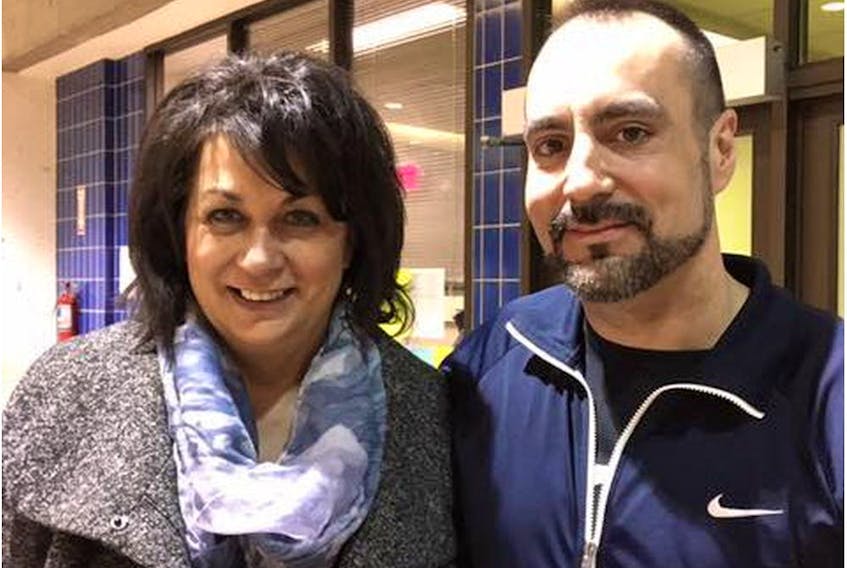Lauren Laithwaite bought a cup of coffee for her son on Friday and placed it on a mantlepiece beside a bouquet of white memorial flowers, spending the second anniversary of Chris Van Camp’s death in quiet reflection. Sharing coffee was something mother and son enjoyed.
Van Camp was found unresponsive in his Saskatchewan Penitentiary cell on the morning of June 7, 2017. He had been on parole briefly in the spring of 2017 after serving part of a sentence at the prison, but was returned to custody after he spent days in a coma resulting from an overdose after using cocaine laced with fentanyl in Calgary.
His cellmate, Tyler Vandewater, was charged with second-degree murder and is expected to be tried in January 2020 in Prince Albert.
As resilient as she and her younger son Ronald Hopkins are, they’ve learned to go with the waves of grief, Laithwaite said.
“We’re living our lives and we’re doing what we’ve always done. We’re going to work and we have moments where we are very happy and experiencing great things and then we have moments where we reflect and we get sad with what happened and dealing with the trial, with as long as it’s taken to even get a trial date set and the fact that I have to sue the government over this — this is not the way I thought I’d be living my life,” she said in an interview on Wednesday.
“How I feel changes day to day, moment to moment.”
Van Camp’s mother and younger brother proceeded with legal action against Canada’s attorney general, who represents the Correctional Service of Canada, Alberta Health Services and Foothills Medical Centre, as well as the former and current chiefs of the Calgary Police Service.
On Friday, the family’s lawyer filed notices to the three defending parties to admit facts, with the aim of obtaining summary judgement, but it’s not clear so far whether that will succeed.
None of the claims presented in the original lawsuit has been proven in court and the facts presented in the notices have not been admitted.
Laithwaite and Hopkins’ lawyer, Regina-based Tavengwa Runyowa, said a court can dispose of an issue if the facts are sufficiently clear and the parties have exchanged documents and records. They contend Van Camp should not have been arrested and returned to custody because the Good Samaritan Drug Overdose Act protected him.
The act came into effect on May 4, 2017. Van Camp was arrested later that month on May 29. The text of the legislation exempts anyone suffering an overdose or anyone else at the scene from charges for a violation of a pre-trial release, probation order, conditional sentence or parole if evidence in support of the offence was obtained or discovered as a result of seeking assistance.
“We feel we have a nice, crisp, clean issue. Was Chris as factually innocent as you or I? Yes he was, because the Good Samaritan act said he was,” Runyowa said.
The plaintiffs want the defendants to admit to certain facts, including:
- Two Calgary police officers presented Foothills Medical Centre ICU staff with a warrant to arrest Van Camp; the warrant had been issued by a parole supervisor officer to suspend his statutory release.
- The reason given for suspension of parole was “For breach of condition: Failure to Abstain from Drugs. Information from Community Sourses (sic) indicate using Opiates;” hospital staff, including a registered nurse, were present when officers executed the warrant just after midnight on May 29, 2017.
- Van Camp had been an intensive care unit patient and placed on life support five days before his arrest; through his brother, his mother informed the parole officer of the overdose and the parole officer assured Laithwaite that Van Camp would not be arrested as a result of the overdose.
- The Good Samaritan Drug Overdose Act was in force at the time of the arrest.
- Van Camp had lost muscle mass and was “diminished in his physical strength and dexterity” at the time of the arrest.
In Alberta, defendants in civil claims have 20 days from the date they were served the notice to provide an answer. The StarPhoenix reached out to media representatives for each of the plaintiffs for comment and did not immediately receive a reply.
Having a court say her son was a patient, not a prisoner, will have a “tremendous impact” for Laithwaite, Runyowa said.
A finding from the court would be a small part of holding the government accountable, Laithwaite said.
“I’m not one usually to run around needing to prove I’m right, but this one I do need to prove I’m right.”
She said her son’s recovery in hospital was interrupted and his civil rights were stepped on.
“Certainly it would make me feel much better for a judge to say ‘You’re right and this will never happen again to anybody.’ ”
Copyright Postmedia Network Inc., 2019









